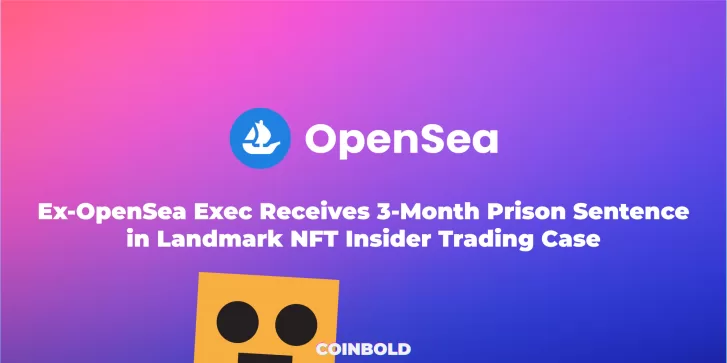Nathaniel Chastain, the former head of product at OpenSea, has been sentenced to three months in prison for participating in the world’s first NFT insider trading case. Chastain utilized his position to gain an unfair advantage and profit from confidential NFT information. Despite the request for a longer sentence, the judge attributed Chastain’s relatively minor gains as a factor in the decision.

A Landmark Case: NFT Insider Trading Comes to Light
In a historic turn of events, Nathaniel Chastain, the former head of product at the renowned NFT platform OpenSea, has been handed a significant three-month prison sentence. This sentencing comes as a consequence of Chastain’s involvement in what is now recognized as the world’s first-ever NFT insider trading case.
Exploiting Trust for Personal Gain
Chastain’s role at OpenSea provided him with a unique responsibility: the authority to select which NFTs would be given a prominent position on the platform. Regrettably, Chastain leveraged this insider information for his personal enrichment, betraying the trust placed in him by his employer. This breach of trust led U.S. District Judge Jesse M. Furman to impose a sentence on Chastain in the courtrooms of New York.
Chastain’s actions extended beyond mere exploitation, as he was found guilty of both fraud and money laundering in May. The court’s ruling serves as a testament to the seriousness of his offenses and their impact on the integrity of the digital asset market.
Unveiling the Unlawful Profits
The Department of Justice revealed that Chastain managed to amass an illicit profit exceeding $50,000 through the trading of at least 45 NFTs. In a cunning effort to conceal his actions, Chastain resorted to using various undisclosed wallets and OpenSea accounts. However, his attempts to hide his trail were eventually exposed, leading to his arrest in June.
A Lesser Sentence Amidst Judicial Considerations
While prosecutors sought a more severe two-year sentence, the judge presiding over the case chose to issue a three-month prison term. The judge’s decision was influenced by the relatively modest gains Chastain accrued from his unlawful activities. This aspect was pivotal in determining the sentence and underscores the significance of the outcomes when it comes to insider trading, even within the NFT space.
A Warning to Corporate Insiders
U.S. Attorney Damian Williams emphasized the significance of Chastain’s sentencing, highlighting the breach of trust that underlies insider trading. Williams conveyed, “Nathaniel Chastain faced justice today for violating the trust that his employer placed in him by using OpenSea’s confidential information for his own profit.” The verdict serves as a cautionary message to individuals in positions of trust within corporations, reiterating that insider trading will be met with legal repercussions, irrespective of the marketplace involved.
Setting a Precedent for the Digital Asset Realm
At the core of this case is the pioneering nature of the charges — the world’s first instance of insider trading involving digital assets. The case has set a precedent for addressing unethical behavior within the rapidly evolving landscape of digital assets and NFTs. As part of the sentencing, Chastain is not only required to serve a three-month prison term but will also undergo three months of home confinement, followed by three years of supervised release.
The case of Nathaniel Chastain stands as a testimony to the commitment of legal authorities to uphold the integrity of financial markets, even in the complex and innovative realm of digital assets.
Read more:
- OpenSea Shifts Focus: Binance Smart Chain (BSC) Support Discontinued to Prioritize Innovation
- OpenSea Adopts Flexible Creator Fee Structure: Empowering NFT Creators
- Americana: Revolutionizing Asset Trading with OpenSea and 776 Venture Capital Backing
- OpenSea Launches “Deals” Feature, Revolutionizing NFT Trading Experience

